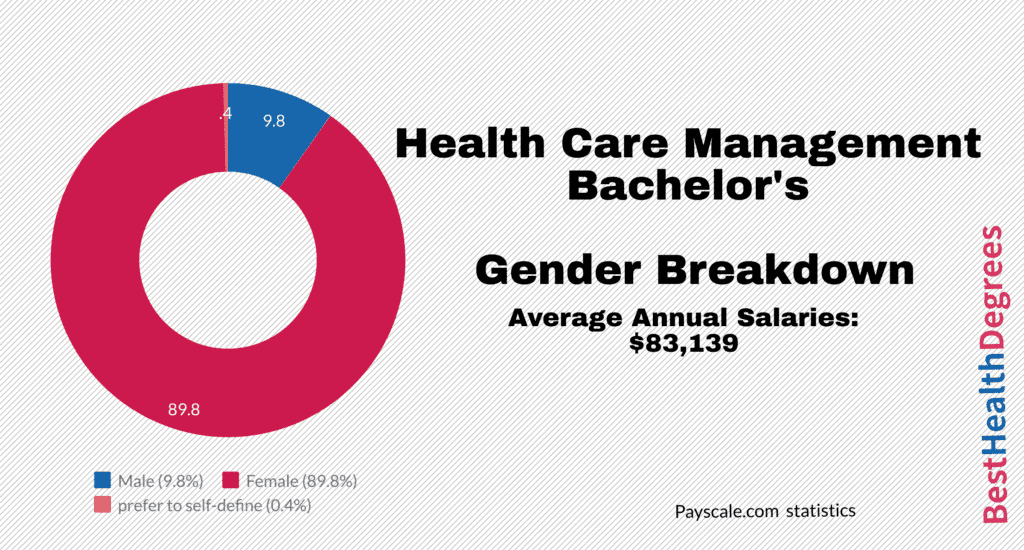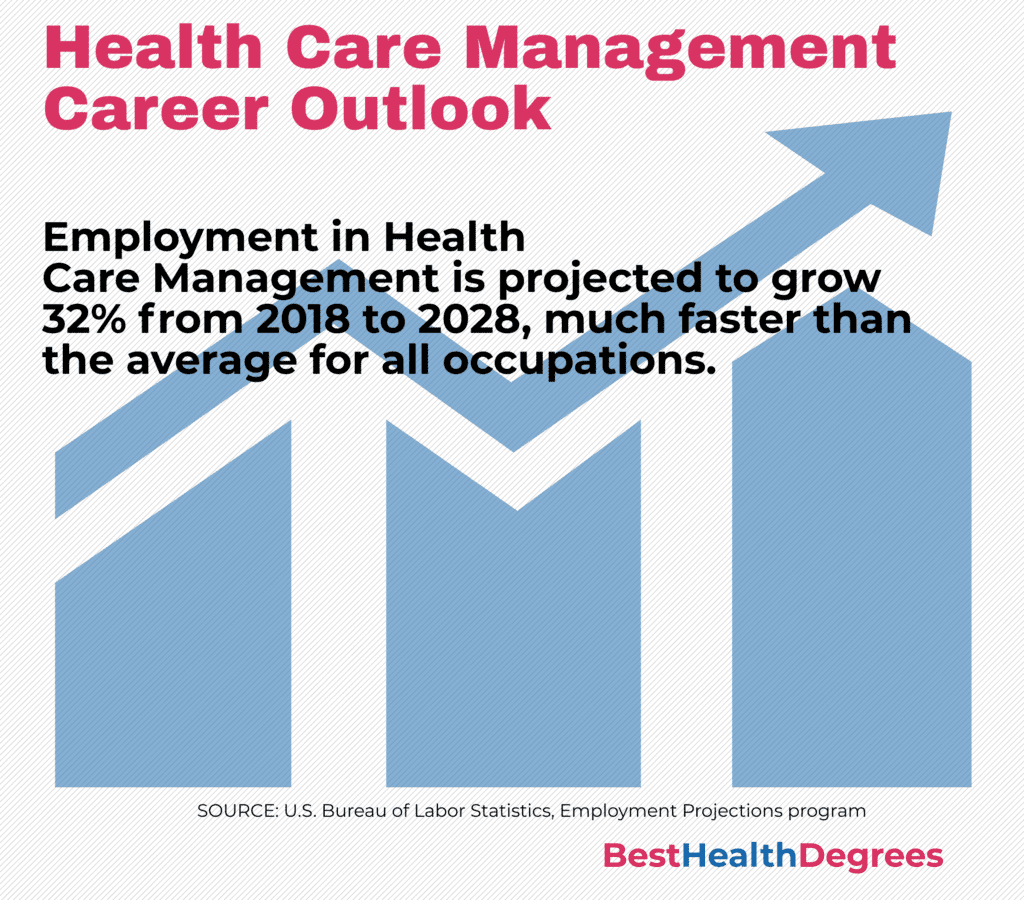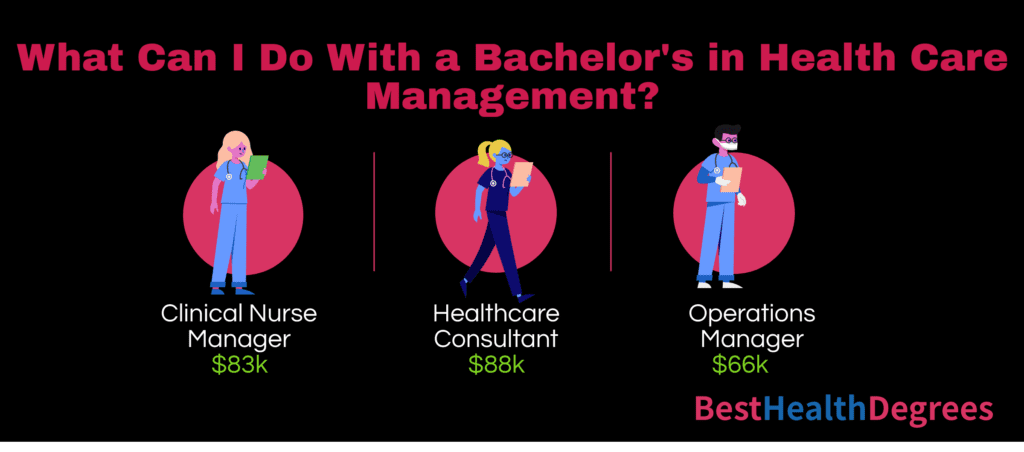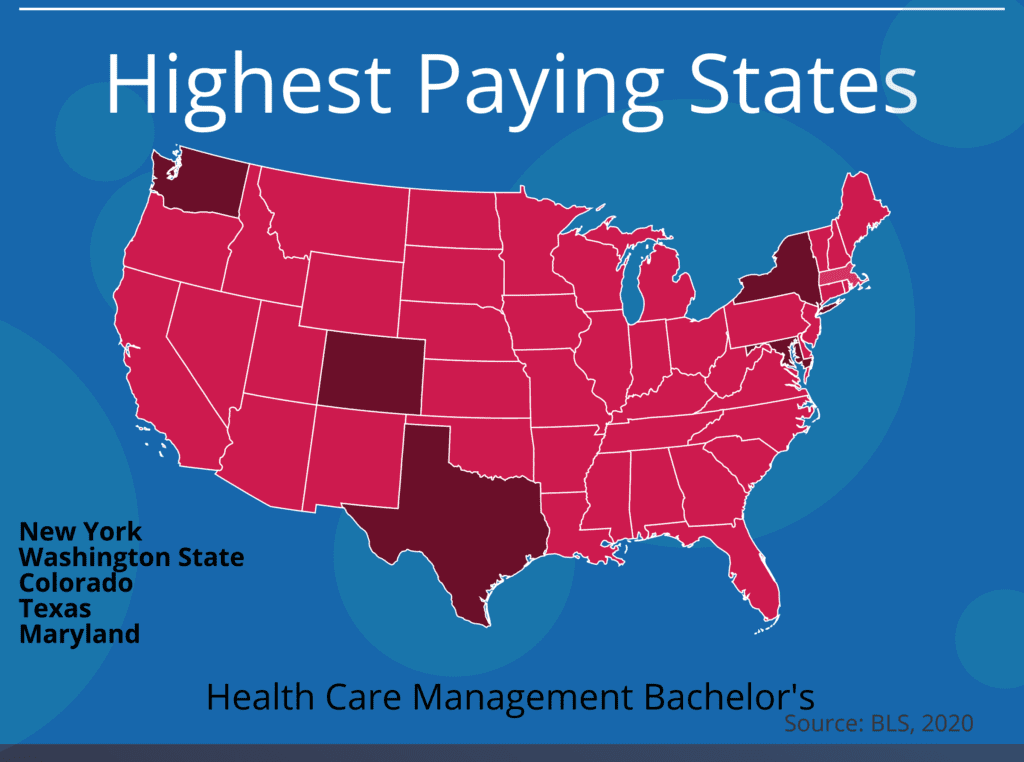Anyone with serious career goals in healthcare administration should consider researching the following inquiries before making a final decision about a career or a degree program:
- What is healthcare management?
- Is there a significant advantage between earning a degree in healthcare management vs healthcare administration?
- Where can I find a list of healthcare management careers or healthcare management career path advice that is available online?
- How can I research available healthcare administration career options?
- How do salaries compare between healthcare management vs healthcare administration?
The reality is the answer to the question – What is healthcare management? – is actually more involved than one would consider. A healthcare management career path offers diverse options but ultimately has to do with the overall management of a facility dedicated to the provision of healthcare initiatives.

Healthcare administration career options include those tasked with the responsibility of coordinating the many health services offered by any healthcare facility. A list of healthcare management careers would include –
- A healthcare consultant
- A healthcare manager
- A healthcare administrator
- A Chief Operating Officer or Chief Compliance Officer
School/Program Accreditation
Accreditation is a formalized process that seeks to standardize the consistency and the quality and consistency of programs and schools within academia. Accreditation agencies evaluate higher-earning institutions as well as individual degree programs with the ultimate objective to
- Ensure consistency exists regarding the academic quality of the nation’s education system on varying levels.
- Protect the public’s interest by holding professional schools, colleges, and universities accountable for the academic degree programs they offer on-campus and online.
The criteria used to determine if the program and or the school complies with the defined accreditation standards will be contingent upon the accreditation level and how a specific industry chooses to administer accreditation for the schools, credentials and programs within the industry. In the United States, there are two fundamental levels of accreditation.
Regional Accreditation in the United States
Among the oldest accreditation processes is regional accreditation. Regional accreditation supports the maintenance of excellence in education across the country by assessing an institution of higher education’s curriculum, and educators’ credentials, which ultimately speaks to the school’s credibility.
The U.S. Department of Education covers the nation with its six regional agencies. Each regional accreditation agency is responsible for managing those schools and related programs in their defined region.
- Northwest Commission on Colleges & Universities (NWCCU)
- Southern Association of Colleges & Schools Commission on Colleges (SACSCOC)
- New England Commission on Higher Education (NECHE)
- WASC Senior College & University Commission (WSCUC)
- The Higher Learning Commission (HLC)
- Middle States Commission of Higher Education (MSCHE)
In addition to the above-noted regional accreditation, institutions of higher education can opt to voluntarily have their programs and school operations open for inspection by accreditation agencies sanctioned by industry leaders. This is known as specialized accreditation. Some of the best online schools for healthcare management offer CAHME-accredited online programs. These accredited online healthcare degrees are discussed below.
CAHME is recognized as the benchmark for accredited online healthcare degrees. Membership in the professional organization known as the CAHME is representative of a wide swath and cross-section of the professional members of the healthcare industry :
- Health care clinicians
- Health care managers/administrators
- Health care educators, among others
The best online schools for healthcare management are typically accredited by the CAHME.
Types of Healthcare Management Degrees
The healthcare industry has been growing exponentially for many decades. The reasons for this explosive growth are many but primarily based on the fact that –
- Healthcare now offers increasingly complex and specialized medicine, and
- The aging of the largest population – the baby boomers.
As such, earning a bachelor of science in healthcare management is a great way to prepare for most entry-level healthcare occupations in administration or management. A bachelor of health administration degree online (or on-campus) is a great springboard that can lead to a master’s or doctoral-level online healthcare administration degree. Furthermore, programs like a Masters in Healthcare Administration also have affordable online MHA programs.
However, it is important to dissect the terminology relative to a healthcare management degree online or on campus.
Bachelor of Health Administration vs Bachelor of Healthcare Management
- Is there a difference between earning a Bachelor of Health Administration compared to a Bachelor of Healthcare Management?
- What schools offer an online hospital management degree, and how does it differ from a healthcare management degree online?
- Which of the following degrees would suit your interests best?
- A Bachelor of Science in Healthcare Management
- A Bachelor of Science in Healthcare Administration
- An online Bachelor’s in Healthcare Management
- An online Bachelor of Science Healthcare Administration

Comparing: Health Administration vs Healthcare Management
Those who earn a healthcare administration degree online will generally be responsible for –
- Managing staff members is typically the responsibility of those who hold a managerial position, having earned a healthcare administration degree online.
- Ensuring a facility meets regulatory compliance requirements.
- Managing finance as some online healthcare administration degree programs offer financial concentrations for degree candidates enrolled in their online healthcare management degree.
Those who earn an online hospital management degree will generally be responsible for –
- Managing the facility’s activities.
- Develop and implement managerial strategies.
Overall, when earning an online healthcare management degree or online healthcare management with a business emphasis, students will explore healthcare law and delve deep into understanding the many procedures and services that may be offered by a healthcare facility. Coursework includes –
- Managerial principles
- Risk assessment
- Leadership
- Finance
- Healthcare information and delivery
- Communications
- Healthcare policy, to name a few
Certifications/Licenses
Healthcare management professionals often choose to supplement their education and training by earning an on-campus or online healthcare management certificate. Professional certification in the healthcare industry is a great way for a job applicant to highlight a particular skill that may be influential to a hiring manager.
Online healthcare program certifications offer a direct way to gain specialized skills required for certain healthcare managerial positions. There are many healthcare management certification online programs in the healthcare sector that may help bolster one’s education and background. Consider these available online healthcare program certifications which offer specialties, based on the program’s objective –
- Global Health – students vying for this healthcare management certification online study healthcare from a panoramic perspective, learning how medicine is practiced across the globe.
- Healthcare Informatics – students study how analytical science and the field of medicine intersect.
- Nutrition – an online healthcare management certificate in nutrition is a smart way to augment a healthcare management degree as it provides a solid background on how to keep patients healthy through appropriate nutrition.
Available Healthcare Certifications
HCCA Certifications
- The CHC – the Certified Healthcare Compliance Certification – is offered by the CCB – the Compliance Certification Board.
- The CHPC – the Certified in Healthcare Privacy Compliance.
- The CHRC – the Certified in Healthcare Research Compliance.
ASHRM – the American Society for Health Care Risk Management
- The CPHRM – the Certified Professional in Healthcare Risk Management.
HFMA – the Healthcare Financial Management Association Certifications
- The CFHP – the Certified Healthcare Financial Professional.
AAHAM – the American Association of Healthcare Administrative Management
- The CRCE – the Certified Revenue Cycle Executive
ACHE – the American College of Healthcare Executives
- The FACHE – a Fellow of the American College of Healthcare Executives.
HIMSS – the Healthcare Information & Management Systems Society
- The CPHIMS – the Certified Professional In Healthcare Information & Management Systems.
PACHCOM – the Professional Association of Healthcare Office Management
The CMM – the Certified Medical Manager. This credential is a nationally recognized credential that speaks to the credentialed individual’s excellence in health care medical practice.

Healthcare Management Jobs
The field of healthcare has been one of the fastest-growing economic sectors for many years. Healthcare management requires a diverse set of professionals, which is why there are so many different healthcare management jobs from which to select. Before one makes their final decision as to which school or program will meet their educational and career objectives, be certain to answer these questions –
- Where can I find a Bachelor of Science in Healthcare Administration job description?
- Are there entry-level jobs in healthcare administration that would meet my salary objectives?
- Will I find that the Bachelor in Healthcare Administration jobs differ from the available Bachelor in Healthcare Management jobs?
- What Bachelor of Science in Healthcare Administration jobs are available if I earn my degree online instead of on-campus?
- Are there entry-level healthcare management jobs where I can work remotely?
- Will the available entry-level jobs in healthcare administration offer sufficient compensation to meet my salary goals?
Let’s take a look at the entry-level healthcare management jobs available. These Bachelor in Healthcare Administration jobs include –
- Healthcare Finance Manager – these healthcare managerial professionals are tasked with the responsibility of managing a facility’s daily financial operations. Specifically, this may include –
- Developing and implementing the facility’s budget.
- Managing the facility’s cash flow.
- Assessing compensation packages, to name a few.
- Quality Assurance/Improvement Manager– these healthcare managerial professionals are tasked with the responsibility of ensuring the facility complies with all regulations and care standards. This includes the identification of areas in need of improvement and the implementation of solutions to improve performance and profits.
- Healthcare Department Manager – these healthcare managerial professionals are tasked with the responsibility of overseeing a specific division or team of professionals within the facility. A healthcare department manager may be responsible for managing a physical therapy or surgical division.
- Physician’s Practice Manager – these healthcare managerial professionals are tasked with the responsibility of strategically growing a facility or organization, in addition to managing its daily operations.
Many of the available bachelor’s in healthcare management jobs are middle-level management, with most upper-level managerial healthcare professionals seeking a more advanced degree.
- A Master of Business Administration (MBA) with an academic focus in healthcare
- A Master of Health Administration (MHA)
- A Master of Public Health
Salary
If one of your goals is to earn a six-figure salary in the health care industry, then the answer to the question of – Is healthcare management a good major? – is a resounding yes! Your best bachelors in healthcare administration salary begin with selecting the right program and school.
The federal government’s BLS (Bureau of Labor Statistics) categorizes healthcare administration careers salary information across several broader classifications. According to the Bureau of Labor Statistics statisticians, there were more than 422,000 health service and medical managers employed in the U.S in 2019, with a median annual salary of $100,980. This translates to an hourly healthcare management major salary of $48.55.
It is vital to note that the government’s statisticians anticipate the job growth for healthcare management or administration jobs to be 32% through the year 2029 – nearly eight times faster than job growth rates averaged for all combined U.S. occupations.
To help with your analysis, consider these top paying states for these healthcare management degree salary options –
| Top Paying States | Employed | Salary |
| District of Columbia | 1,600 | $150,040 |
| New York | 25,740 | $147,000 |
| Hawaii | 1,540 | $133,320 |
| California | 36,940 | $133,040 |
| Massachusetts | 15,810 | $132,960 |
Consider these top-paying metro areas –
| Top Paying Metro Areas | Salary |
| Santa Cruz, CA | $163,280 |
| Vallejo -Fairfield, CA | $159,190 |
| Bridgeport – Stamford, CT | $154,570 |
| Salinas, CA | $154,440 |
| Hanford – Corcoran, CA | $145,340 |
| San Jose – Santa Clara, CA | $144,530 |
| New York, Newark, Jersey City, NY, PA, NJ | $144,370 |
Consider these top-paying non-metro areas —
| Top Paying Non-Metro Areas | Salary |
| New Hampshire Non-metro | $144,920 |
| Mother Lode, Eastern Sierra, CA | $135,720 |
| Non-Metro Upstate – Central, NY | $127,960 |
| Northern Upstate NY | $125,850 |
| Western North Dakota | $123,900 |
Consider these industries that offer the highest level of healthcare and medical professional employment –
| Industries with Highest Employment | Employed (2019) |
| General Medical & Surgical Hospital Facilities | 125,230 |
| The Offices of Physicians | 48,780 |
| Outpatient Care Centers & Facilities | 28,170 |
| Nursing Care Facilities (Including Skilled Nursing) | 25,780 |
| Home Health Care Agencies & Services | 21,190 |
Consider these industries that offer the highest salaries for those professionals employed in the healthcare and medical industries–
| Top Paying Industries | Salary |
| Pharmaceutical & Medicine Manufacturing | $204,300 |
| Scientific Research & Development Services | $169,240 |
| Wholesale Electronic Markets, Agents, Brokers | $162,880 |
| Navigational, Measuring & Control Instruments Manufacturing | $159,910 |
| Chemical Manufacturing | $155,180 |

Professional Organizations in Health Care Management
Professional organizations in any industry offer industry members and workers membership in an organization with common goals, objectives, and professional standards.
There are a variety of professional organizations devoted to the managers and administrators of healthcare facilities and service organizations. These professional organizations champion industry-related causes and offer its members:
- Networking Opportunities
- Mentorship options for newly graduated professionals
- Education Opportunities
- Training events and workshops
- Job boards, to name a few
Because the health care industry is forever in flux and evolving, healthcare managers and administrators find great benefits by joining a professional organization dedicated to healthcare management.
Each of the professional organizations detailed below offers membership benefits and services, some of which are quite specific to a slice of the healthcare management industry. These health care professional organizations are industry leaders and provide resources and assistance to healthcare professionals and those studying to become healthcare managers or administrators.
The NAHAM – the National Association of Healthcare Access Management (NAHAM)
The National Association of Healthcare Access Management is a healthcare industry professional organization that was developed to help industry professionals perform at the highest possible standards.
- Promoting the best medical practices in the industry and its members.
- Establishing subject matter experts to work among healthcare professionals across the industry and the world.
The National Association of Healthcare Access Management offers its members great benefits like –
- Networking events, online meetings & relevant workshops.
- Academic programs to help professionals meet or exceed industry licensing requirements.
- Credential and certification opportunities through education and testing.
The National Association of Healthcare Access Management is a great fit for healthcare managers. The annual membership fee to join the National Association of Healthcare Access Management is $102.50. The National Association of Healthcare Access Management also offers an associate membership, which is discounted at a rate of $65 per year. The associate membership is a limited membership and is designed for those in the healthcare industry who are employed as non-managers.
The AAHAM – the American Assoc. of Healthcare Administrative Mgt.
The American Association of Healthcare Administrative Management was founded in the 1960s as the American Guild of Patient Account Management.
Since then, the AAHAM has grown into one of the most successful and prominent health care professional organizations. Its objective is to provide health care administrators and managers a comprehensive set of relevant resources that assist them in their professional duties, including –
- Professional networking opportunities
- Meetings & workshops
- Certifications and credentials
- Mentorship for health care managerial professionals
- Education and coursework designed to meet the needs of health care managers charges with the responsibility of managing the revenue of a medical facility
If you are enrolled in school as a full-time student (defined as a minimum course load equal to 12 credit units), you are entitled to join the American Association of Healthcare Administrative Management at no cost – although membership is limited and does not provide for voting rights.
The American Association of Healthcare Administrative Management’s national membership runs $209 each year. However, if you join mid-year, the membership fee for the year will be prorated accordingly.
The American College of Healthcare Executives (ACHE)
The ACHE – the American College of Healthcare Executives, has 75 chapters in and around the country, with a total ACHE membership that is more than 40,000 healthcare professionals. The ACHE’s objective is to support healthcare managers and administrators by providing resources that reduce healthcare expenses and make healthcare more accessible to everyone.
Healthcare managers and administrators who choose to become ACHE members make a decision to seek lifelong learning. Membership in the American College of Healthcare Executives includes educational commitments regarding leadership, inclusion, & diversity across the board. The members of the American College of Healthcare Executives receive these opportunities and benefits –
- Volunteering and networking opportunities that provide experiential learning
- Academic programs and educational services to introduce new technologies, relevant legal changes, and cutting-edge research
- Job boards, to name a few
The American College of Healthcare Executives charges its members $160 per year for a two-year commitment to membership. The ACHE dues increase and cost $265 over the next three years. At year five, the ACHE membership increase to $345 per year.
The Healthcare Financial Management Association (HFMA)
The HFMA – the Healthcare Financial Management Association, is a professional organization dedicated to the healthcare managerial field that specializes in finance. Its current is more than 50,000 strong. The Healthcare Financial Management Association’s objective is to help its members – financial healthcare managers – meet or exceed the expectations of a facility. The Healthcare Financial Management Association provides academic and educational classes as well as credentials for healthcare management professionals who are tasked with the management of a healthcare facility’s finances. Among the members’ benefits are –
- Relevant workshops, events, and conferences at the local & national level
- Topical seminars related to healthcare finance that are available online or in person
- Distance-learning opportunities that support financial healthcare managers’ career objectives, among others
The Healthcare Financial Management Association offers a student membership fee, discounted at $50 per year. The Healthcare Financial Management Association provides different levels of membership that are based on the members’ role in the financial division of the healthcare facility. Membership options cost between $175 to $495.
Related Rankings: